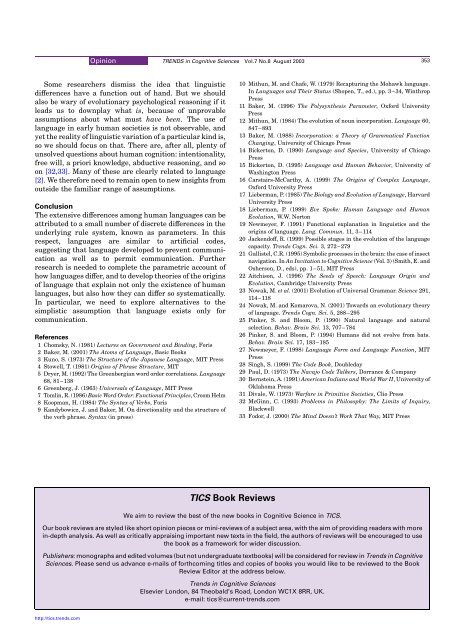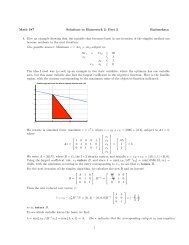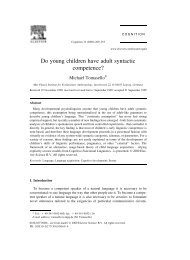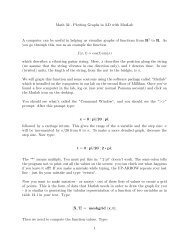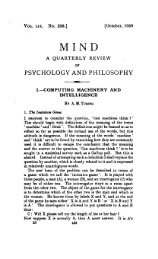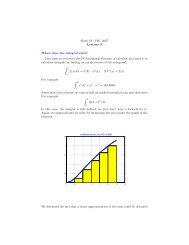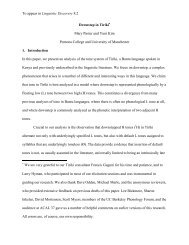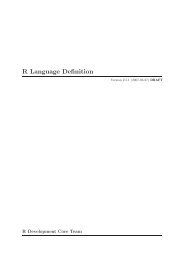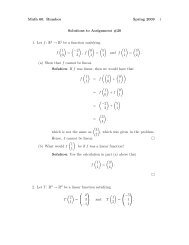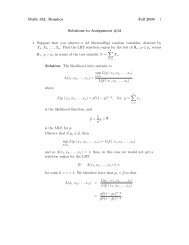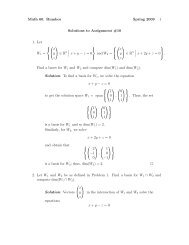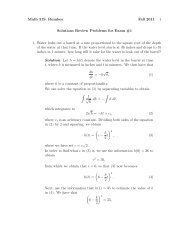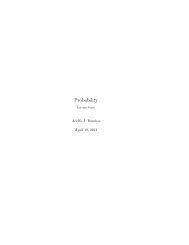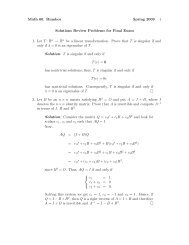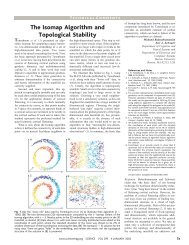Linguistic differences and language design
Linguistic differences and language design
Linguistic differences and language design
Create successful ePaper yourself
Turn your PDF publications into a flip-book with our unique Google optimized e-Paper software.
Opinion TRENDS in Cognitive Sciences Vol.7 No.8 August 2003 353Some researchers dismiss the idea that linguistic<strong>differences</strong> have a function out of h<strong>and</strong>. But we shouldalso be wary of evolutionary psychological reasoning if itleads us to downplay what is, because of unprovableassumptions about what must have been. The use of<strong>language</strong> in early human societies is not observable, <strong>and</strong>yet the reality of linguistic variation of a particular kind is,so we should focus on that. There are, after all, plenty ofunsolved questions about human cognition: intentionality,free will, a priori knowledge, abductive reasoning, <strong>and</strong> soon [32,33]. Many of these are clearly related to <strong>language</strong>[2]. We therefore need to remain open to new insights fromoutside the familiar range of assumptions.ConclusionThe extensive <strong>differences</strong> among human <strong>language</strong>s can beattributed to a small number of discrete <strong>differences</strong> in theunderlying rule system, known as parameters. In thisrespect, <strong>language</strong>s are similar to artificial codes,suggesting that <strong>language</strong> developed to prevent communicationas well as to permit communication. Furtherresearch is needed to complete the parametric account ofhow <strong>language</strong>s differ, <strong>and</strong> to develop theories of the originsof <strong>language</strong> that explain not only the existence of human<strong>language</strong>s, but also how they can differ so systematically.In particular, we need to explore alternatives to thesimplistic assumption that <strong>language</strong> exists only forcommunication.References1 Chomsky, N. (1981) Lectures on Government <strong>and</strong> Binding, Foris2 Baker, M. (2001) The Atoms of Language, Basic Books3 Kuno, S. (1973) The Structure of the Japanese Language, MIT Press4 Stowell, T. (1981) Origins of Phrase Structure, MIT5 Dryer, M. (1992) The Greenbergian word order correlations. Language68, 81–1386 Greenberg, J. (1963) Universals of Language, MIT Press7 Tomlin, R. (1986) Basic Word Order: Functional Principles,CroomHelm8 Koopman, H. (1984) The Syntax of Verbs, Foris9 K<strong>and</strong>ybowicz, J. <strong>and</strong> Baker, M. On directionality <strong>and</strong> the structure ofthe verb phrase. Syntax (in press)10 Mithun, M. <strong>and</strong> Chafe, W. (1979) Recapturing the Mohawk <strong>language</strong>.In Languages <strong>and</strong> Their Status (Shopen, T., ed.), pp. 3–34, WinthropPress11 Baker, M. (1996) The Polysynthesis Parameter, Oxford UniversityPress12 Mithun, M. (1984) The evolution of noun incorporation. Language 60,847–89313 Baker, M. (1988) Incorporation: a Theory of Grammatical FunctionChanging, University of Chicago Press14 Bickerton, D. (1990) Language <strong>and</strong> Species, University of ChicagoPress15 Bickerton, D. (1995) Language <strong>and</strong> Human Behavior, University ofWashington Press16 Carstairs-McCarthy, A. (1999) The Origins of Complex Language,Oxford University Press17 Lieberman, P. (1985) The Biology <strong>and</strong> Evolution of Language, HarvardUniversity Press18 Lieberman, P. (1999) Eve Spoke: Human Language <strong>and</strong> HumanEvolution, W.W. Norton19 Newmeyer, F. (1991) Functional explanation in linguistics <strong>and</strong> theorigins of <strong>language</strong>. Lang. Commun. 11, 3–11420 Jackendoff, R. (1999) Possible stages in the evolution of the <strong>language</strong>capacity. Trends Cogn. Sci. 3, 272–27921 Gallistel, C.R. (1995) Symbolic processes in the brain: the case of insectnavigation. In An Invitation to Cognitive Science (Vol. 3) (Smith, E. <strong>and</strong>Osherson, D., eds), pp. 1–51, MIT Press22 Aitchison, J. (1996) The Seeds of Speech: Language Origin <strong>and</strong>Evolution, Cambridge University Press23 Nowak, M. et al. (2001) Evolution of Universal Grammar. Science 291,114 – 11824 Nowak, M. <strong>and</strong> Komarova, N. (2001) Towards an evolutionary theoryof <strong>language</strong>. Trends Cogn. Sci. 5, 288–29525 Pinker, S. <strong>and</strong> Bloom, P. (1990) Natural <strong>language</strong> <strong>and</strong> naturalselection. Behav. Brain Sci. 13, 707–78426 Pinker, S. <strong>and</strong> Bloom, P. (1994) Humans did not evolve from bats.Behav. Brain Sci. 17, 183–18527 Newmeyer, F. (1998) Language Form <strong>and</strong> Language Function, MITPress28 Singh, S. (1999) The Code Book, Doubleday29 Paul, D. (1973) The Navajo Code Talkers, Dorrance & Company30 Bernstein, A. (1991) American Indians <strong>and</strong> World War II, University ofOklahoma Press31 Divale, W. (1973) Warfare in Primitive Societies, Clio Press32 McGinn, C. (1993) Problems in Philosophy: The Limits of Inquiry,Blackwell33 Fodor, J. (2000) The Mind Doesn’t Work That Way, MIT PressTICS Book ReviewsWe aim to review the best of the new books in Cognitive Science in TICS.Our book reviews are styled like short opinion pieces or mini-reviews of a subject area, with the aim of providing readers with morein-depth analysis. As well as critically appraising important new texts in the field, the authors of reviews will be encouraged to usethe book as a framework for wider discussion.Publishers: monographs <strong>and</strong> edited volumes (but not undergraduate textbooks) will be considered for review in Trends in CognitiveSciences. Please send us advance e-mails of forthcoming titles <strong>and</strong> copies of books you would like to be reviewed to the BookReview Editor at the address below.Trends in Cognitive SciencesElsevier London, 84 Theobald’s Road, London WC1X 8RR, UK.e-mail: tics@current-trends.comhttp://tics.trends.com


